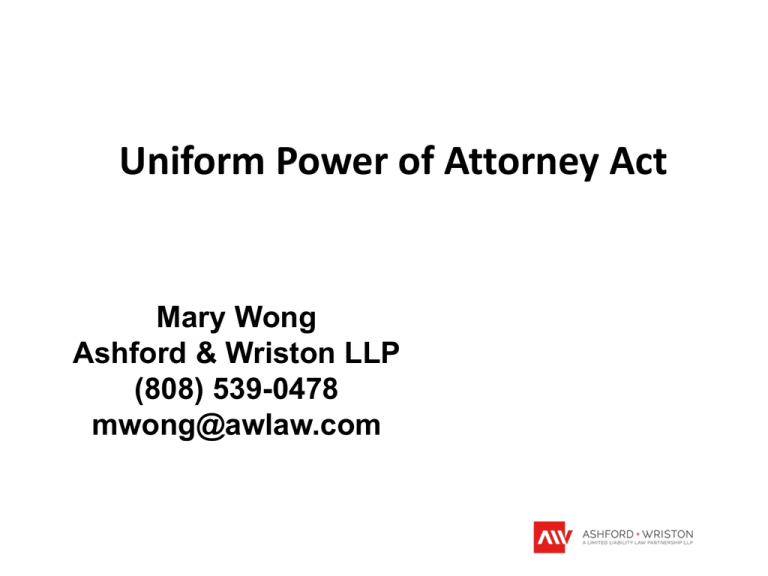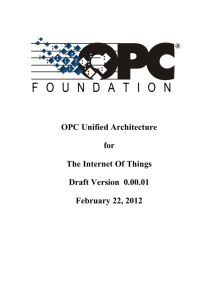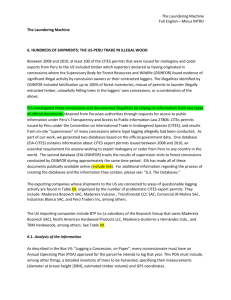Uniform Power of Attorney Act
advertisement

Uniform Power of Attorney Act Mary Wong Ashford & Wriston LLP (808) 539-0478 mwong@awlaw.com Hawaii Act 22 • April 17, 2014 – Effective Date • POA must be signed by Principal • Principal’s signature is presumed genuine if notarized • Photocopy is the same as an original • POAs created under the Act are: • effective immediately (unless specified otherwise) – DURABLE (unless specified otherwise, or an exception applies, or the authority terminates) Powers of Attorney • A legal document granting an AGENT (Attorney-inFact) authority to act in the place of a PRINCIPAL • E.g., manage finances, sign documents • Durable vs. Non-Durable • Revocable • Invalid upon the death of the Principal • Special/Limited vs. General • Special rules for fiduciaries (non-durable; special/limited) Termination of Agent’s Authority – Principal revokes POA – Action filed to dissolve or annul a marriage – Incapacity of principal if POA is not durable – Incapacity of principal if a fiduciary or trustee (even if POA purports to be durable) – Incapacity of agent (whether or not durable) – Termination clause may be included in POA General Powers Authority in the POA granting general authority with respect to financial institutions includes the following authority (unless otherwise specified): • To establish, continue, modify and terminate an account or other banking arrangement • To contract for services available from the Credit Union • To withdraw EFT, money or property of the Principal by check, order, EFT, etc. General Powers – continued • To receive statements of account, vouchers, notices, etc. and take action • To enter a safe deposit box/vault; withdraw or add to contents • To make, endorse, guarantee, etc. promissory notes, checks, drafts, etc. General Powers – continued • To apply for, receive, and use credit/debit cards, EFTs, traveler’s checks, etc. • To consent to an extension of the time, etc. • To borrow money and pledge as security personal property of the Principal necessary to borrow money or pay, renew, or extend the time of payment of a debt of the Principal General Powers – continued If the POA includes general authority with respect to financial institutions, that authority includes borrowing money and pledging personal property of the Principal with respect to payment of the Principal’s debt (unless otherwise specified) General Powers – continued If the POA includes general authority with respect to real property, that authority includes borrowing money and pledging real property of the Principal with respect to payment of the Principal’s debt (unless otherwise specified) General Powers – continued If the POA includes general authority with respect to tangible personal property, that authority includes borrowing money and pledging tangible personal property of the Principal with respect to payment of the Principal’s debt (unless otherwise specified) 4 Options for Acknowledged POAs 1. 2. 3. 4. Accept it Request certification (always advisable) Request translation Request an opinion of counsel *No later than 7 business days after presentation Liability for Refusal to Accept POA • Must accept POA within 5 business days after receipt of certification, translation or opinion of counsel • No time limit for presenter to provide requested item • You may NOT require an additional or different form of POA (unless the POA is deficient) • If you wrongfully refuse to accept an acknowledged POA, you may be subject to: a) A court order mandating acceptance; and b) Liability for reasonable attorneys’ fees and costs Acceptance of and Reliance Upon POA • A Credit Union is protected if it in good faith accepts an acknowledged POA without actual knowledge that: 1) the signature is not genuine; 2) the POA is void, invalid, or terminated; 3) the Agent’s authority is void, invalid or terminated; or 4) the Agent is exceeding or improperly exercising the Agent’s authority. Certification by Agent • Certification by Agent (statutory sample) • Consider adding indemnification of Credit Union • Exceptions regarding Agents for Fiduciaries and Trustees – Incapacity of Principal – Resignation of Principal When It’s OK to Refuse a POA • If the Credit Union is not required to engage in a transaction with the Principal • If engaging in a transaction with the Agent or Principal would be inconsistent with federal law; • If the Credit Union has actual knowledge that POA has been terminated When It’s OK to Refuse a POA • If the Credit Union’s request for certification, translation or opinion of counsel is refused • If the Credit Union in good faith believes the POA is invalid or that Agent does not have authority to perform the act requested • If the Credit Union makes (or has actual knowledge that another person made), a report to Adult Protective Services against the Agent Exceptions • The Act does not apply to – Proxies to exercise voting rights or management rights (e.g. meetings of the members, directors, committees) – POAs coupled with an interest – Health care directives – Certain guardianships Exceptions • Portions of the Act do not apply to – POAs prior to April 17, 2014 (special treatment) – Out-of-state POAs (special treatment) Miscellaneous • No special POA form is required • If there are two or more Agents, each may act independently (unless otherwise specified) Miscellaneous • An express grant of authority is needed for certain matters – Exercise of fiduciary duties that the Principal is allowed to delegate – Making of gifts – Making of gifts to the Agent or its charge, if the Agent is not an ancestor, spouse or descendent of the Principal Miscellaneous • Use the ability to request Opinion of Counsel in appropriate circumstances • When in doubt, consult the Credit Union’s attorney or HCUL’s Ask-A-Lawyer program Neither the speaker nor Ashford & Wriston is rendering any legal opinions in this presentation (including any written material). This presentation is provided for general information only. Exceptions may apply. The reader should consult an attorney before applying the information to a specific situation.












